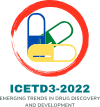Speaker
Description
Assessment of pharmacokinetic (PK) drug-drug interaction (DDI) is an important requirement of drug development. This is necessary because characterizing the clinically relevant DDIs inform the dose adjustment strategy in patients receiving polypharmacy. However, typical drug development trials are restricted to adult population only (i.e., excluding children) due to ethical and logistical constraints. This leaves the pediatric population as ‘therapeutically orphan’, because the safe and effective dosage for this population are not formally determined during typical drug development. As a result, drug dosing in the pediatric clinics are largely off-label, which impose significant risk to this special population. In addition to this, presence of DDIs further increase the risk.
Unlike adults, dedicated DDI studies are rare in children, primarily because, most clinical pharmacology studies in pediatric patients are done opportunistically. Therefore, assessment of DDI in children becomes challenging using the conventional methods used in adults. Physiology-based pharmacokinetic (PBPK) modeling, in this context, is useful to address the gap. PBPK modeling has the unique ability to predict the PK of a drug by integrating the drug-specific properties with the physiological variables of the target population, obviating the need of extensive clinical data. Therefore, application of PBPK modeling is increasing in understanding the possible DDI implications in pediatric dose adjustment.
This work demonstrates the use of PBPK modeling in understanding the DDI potential of enzyme-inducing antiepileptic drugs (EIAEDs) on the PK of oxcarbazepine and levetiracetam, two new generation antiepileptic drugs (AEDs), frequently used in pediatric epileptic patients.
